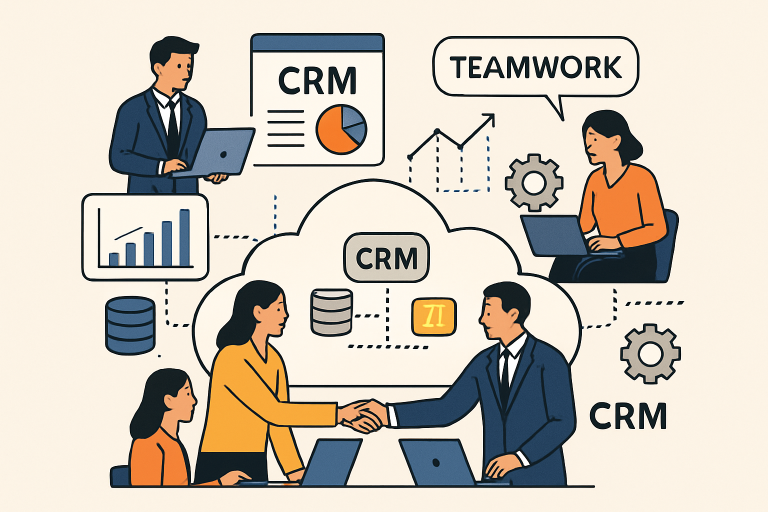Table of Contents
- A New Era for Business Growth
- What Makes a CRM Solution Strategic
- Tailoring Salesforce Solutions
- Empowering Teams with Automation and Data-Driven Insights
- Improving Customer Experiences at Every Touchpoint
- Steps to Adopt a Strategic Salesforce Solution
- Measuring Impact: From ROI to Lasting Change
- Conclusion
A New Era for Business Growth
Digital transformation has become essential for sustainable growth, with companies leveraging cloud-based systems to adapt quickly, innovate, and strengthen customer connections while reshaping operations and collaboration. Leading this shift are Customer Relationship Management (CRM) tools that serve as engines of efficiency, insight, and growth. As organizations shift to digital-first strategies, a certified Salesforce consulting partner for business growth becomes a trusted ally, unlocking the full potential of CRM platforms to drive smarter business outcomes. By investing in solutions that align with the unique needs of their business, companies can spark innovation, enhance decision-making, and achieve meaningful market differentiation.
Cloud-based platforms unify data access across departments, enabling collaboration and value-focused work. By replacing siloed systems with integrated solutions, businesses gain a complete customer view that drives richer experiences, faster responses, and long-term loyalty.
What Makes a CRM Solution Strategic?
Not all CRMs are created equal. Strategic solutions go beyond simple contact management; they become the foundation for how businesses understand and engage with their customers. Effective CRM systems automate and align business processes, such as marketing campaigns, sales pipelines, and service requests, while delivering actionable insights for every stage of the customer journey. Key features, including automation, advanced analytics, customization, and scalability, distinguish these platforms from generic offerings. A successful CRM implementation harnesses these advanced capabilities to enhance collaboration, boost productivity, and drive customer satisfaction. As highlighted in Forbes, organizations that treat their CRM as a cornerstone for business strategy are better equipped to capture new opportunities and drive long-term growth.
Tailoring Salesforce Solutions: One Size Does Not Fit All
No two businesses are alike—industry challenges, regulatory requirements, and customer behaviors all influence the path to success. The most effective Salesforce deployments are those tailored specifically to each organization’s needs, processes, and growth targets. Custom workflows can automate everything from sales approvals to case management, while bespoke integrations connect Salesforce seamlessly to ERP, finance, marketing automation, or other business-critical systems.
For example, a retail organization might integrate Salesforce with its e-commerce backend to unify inventory and online orders, speeding up fulfillment and improving service. Similarly, a financial services firm can build custom approval processes that ensure regulatory compliance while streamlining the customer onboarding process. By moving beyond out-of-the-box features, companies amplify the impact of their CRM investment.
Empowering Teams with Automation and Data-Driven Insights
Automation liberates employees from repetitive manual tasks, freeing them to focus on strategic work and high-value client interactions. With robust process automation, teams can seamlessly qualify leads, assign customer requests, and nurture prospects with personalized communication, thereby minimizing bottlenecks and reducing human error.
Data is the new currency for modern businesses. Advanced analytics and real-time reporting enable more intelligent decisions in sales forecasting, campaign targeting, and resource allocation. Platforms like Salesforce are now leveraging artificial intelligence (AI) to help companies uncover trends, predict customer needs, and personalize experiences at scale. Businesses adopting analytics and AI are experiencing significant gains in efficiency, effectiveness, and profitability.
Improving Customer Experiences at Every Touchpoint
Every interaction is an opportunity to build loyalty and trust. Personalizing the customer journey—whether through targeted messaging, seamless cross-channel engagement, or proactive service—creates memorable moments that distinguish a brand. Proactive support, real-time communication, and anticipation of customer needs are all enabled by a strategic CRM, fostering deeper loyalty at every stage.
To optimize each touchpoint, businesses should map the entire customer journey, identify key moments, and utilize CRM capabilities to deliver timely, relevant, and helpful experiences—Foster continuous feedback loops to adapt quickly to changing demands and expectations.
Steps to Adopt a Strategic Salesforce Solution
Successfully implementing a strategic Salesforce solution is a journey that starts with a clear needs assessment—interviewing stakeholders, defining objectives, and outlining current pain points. Next, organizations should develop a phased plan for rollout, including selecting the right features, configuring customizations, and onboarding users through comprehensive training.
Key checklist items for successful adoption:
- Engage leadership and key stakeholders early
- Map core business processes and pain points
- Set measurable goals linked to business outcomes
- Develop a training and adoption plan
- Establish ongoing support and continuous improvement cycles
Measuring Impact: From ROI to Lasting Change
The success of digital transformation hinges on consistent measurement and iteration. Key performance indicators (KPIs) might include sales pipeline velocity, customer retention rates, improved response times, and overall return on investment (ROI). Gathering regular feedback from end-users and customers enables organizations to make ongoing enhancements, ensuring the CRM system remains aligned with evolving business goals.
Continual improvement is essential; by fostering a culture of adaptability, businesses can maximize the value of their technology investment and ensure their strategic CRM supports growth for years to come.
Conclusion
The path to sustainable business growth lies in embracing digital transformation with a strategic, tailored CRM approach. By unifying data, automating processes, and empowering teams with actionable insights, companies can deliver exceptional customer experiences, respond swiftly to market changes, and make smarter, data-driven decisions. When combined with a commitment to continuous improvement and a clear alignment between technology and business goals, these efforts create a powerful foundation for long-term success and meaningful competitive advantage.








.png)

No comments:
Post a Comment
I value the input of my readers and welcome their engagement. However, in order to maintain a constructive dialogue, I will be moderating comments to remove any spam, excessively critical remarks, or contributions that do not enhance the discussion. I appreciate your understanding in this matter and look forward to receiving your insightful feedback.